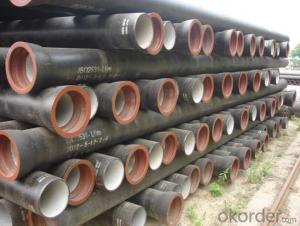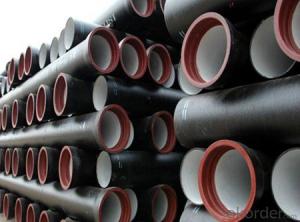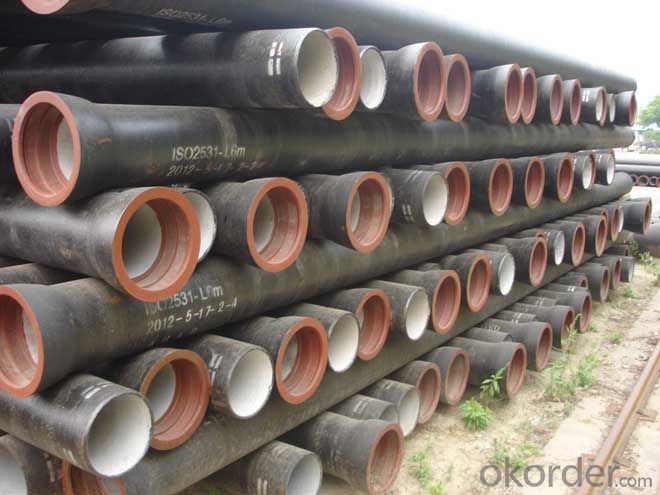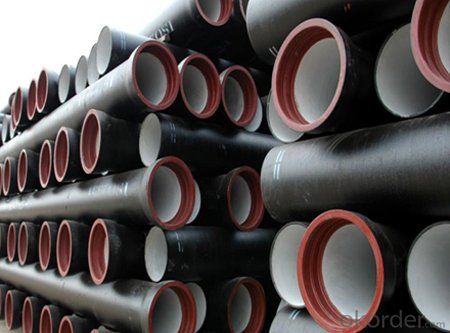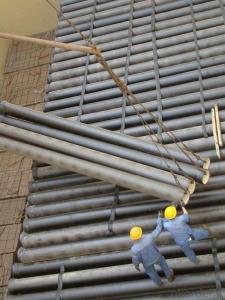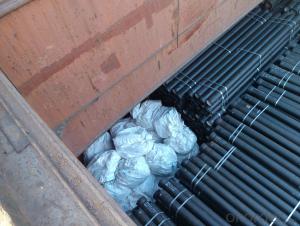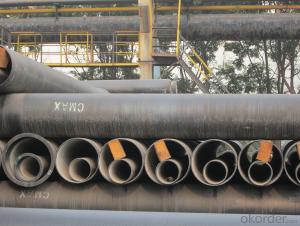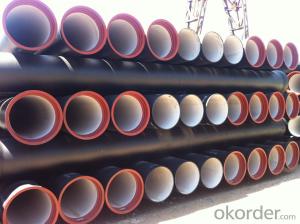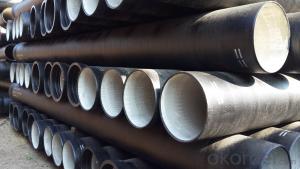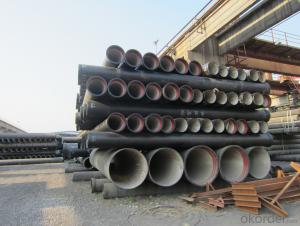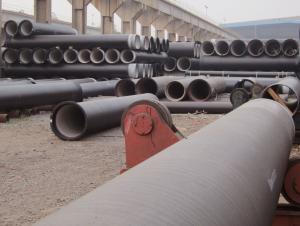Ductile Iron Pipe of China DN400 EN545/EN598/ISO2531 High Quality
- Loading Port:
- China main port
- Payment Terms:
- TT or LC
- Min Order Qty:
- 23 m.t.
- Supply Capability:
- 100000 m.t./month
OKorder Service Pledge
OKorder Financial Service
You Might Also Like
1,Ductile Iron Pipe Description :
1) Pipes confirm to ISO2531,K9 class,T type joint,6m long,with inside cements lining conform to ISO4179, outside Zinc spraying(130g/m2) and bitumen coating(70μm) conform to ISO8179.
2) Pipe ends: Spigot and socket ends, with 100% SBR rubber gaskets accoding to ISO4633
3) we can do third party inspection according to customer's request.
4) Our products have been sold to many international market, such as Middle East and South East Asia and Africa.
2,Main Features of the Ductile Iron Pipe:
1).Quality guarantee
• Chemical checking
• NDE after rough machining
• Mechanical testing after heat treatment
• Final NDE,dimension inspected
2).Quality document
• Full Q.A document as per client request
3).Packing and Shipping
• standard export package(carton/wooden case/pallet)
• accept FOB,FAS,CNF,CIF door to door etc or customer designated shipping agent
4).Service
• Drawing: we can translate your original drawing, offer best suggestion on design
• Quality: we have full set quality control system to guarantee the best quality.
• Inspection: inspect in house, all our products must be checked 3 times before packing
•High yield strength
•High tensile Strength
•High corrosion resistance
•Pressure Resistence
•Anti-corrosion
•Installation is convenient
•Satisfy the highest hygienic standards
3,Ductile Iron Pipe Images:
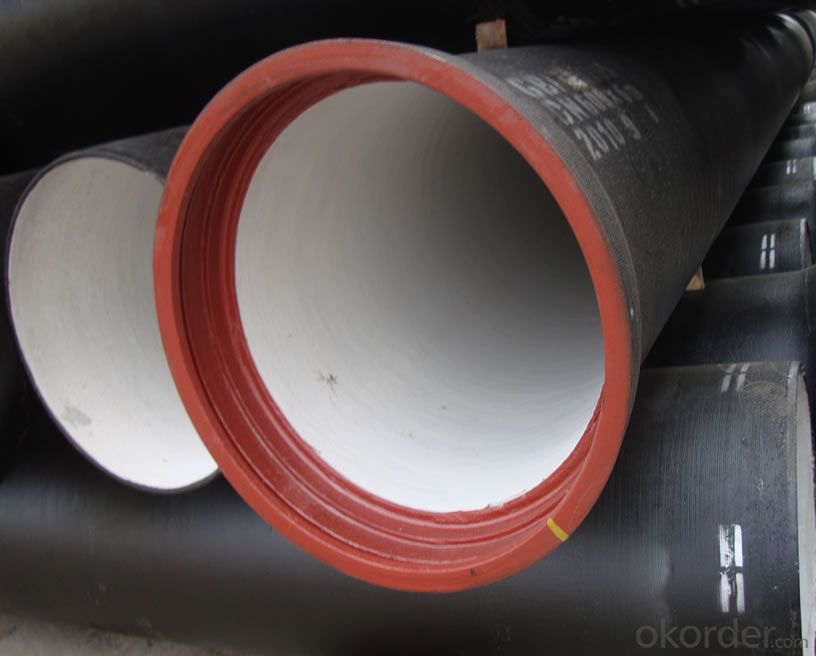
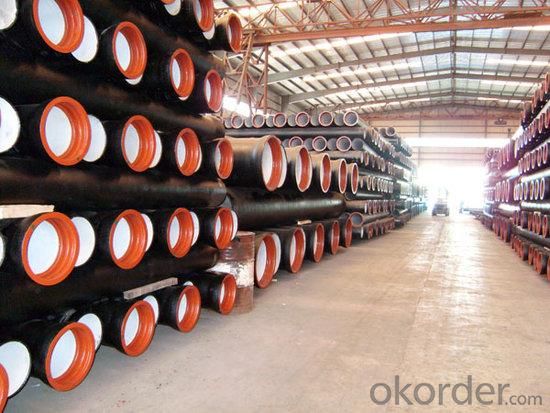
4. Ductile Iron Pipe Specification:
Internal lining: ductile iron pipes shall have an internal cement mortar lining in acc with ISO4179.
External coating: ductile iron pipes shall be externally coated with metallic zinc spray plus a further layer of resin painting to ISO8179.
Gasket: 100% SBR/NBR/EPDM rubber gasket in accordance with ISO4633.
Packing: ductile iron pipes from DN100 to DN300 be bundled with steel belts, others are in bulk.
Payment term: L/C, T/T.
Packing: In bulk vessel or in container
5.FAQ:
We have organized several common questions for our clients,may help you sincerely:
1.Q: Why would you choose ductile iron pipe rather than other pipe materials?
A:The reasons are obvious for that not only ductile iron pipe possesses the inherent strength and flexibility of ductile iron, combined with proven corrosion protection systems, but also the cost savings can be achieved from design to installation and commissioning.
2.Q:Why can you guarantee the inner of pipes can’t be corroded?
A: High alumina cement mortar lining and sulphate-resistant cement mortar lining. These two special linings are applicable to inner anti-corrosion for sewage pipes, improving resistance to erosion of the sewage components.
- Q: How are ductile iron pipes protected against abrasion or wear?
- Ductile iron pipes are protected against abrasion or wear through various methods and protective coatings. One of the most common methods is the application of cement mortar lining on the inner surface of the pipe. The cement mortar creates a smooth and hard layer that resists the effects of abrasion and wear caused by the flowing water or other materials passing through the pipe. Additionally, ductile iron pipes can be externally protected by applying a bituminous or epoxy coating. These coatings provide a barrier against external factors such as soil or chemicals that may cause wear or corrosion. The coating acts as a protective layer, preventing direct contact between the iron pipe and the surrounding environment. Moreover, for areas with severe abrasion or wear conditions, special linings or coatings can be applied. Polyethylene encasement or polyurethane lining can be used to provide enhanced protection against abrasion, particularly in areas where the pipe is exposed to high levels of turbulence or abrasive materials. In some cases, ductile iron pipes can also be reinforced with additional materials such as fiberglass or steel wire to increase their resistance to abrasion or wear. These reinforcements provide an extra layer of protection, strengthening the pipe and reducing the likelihood of damage. Overall, ductile iron pipes are designed with a combination of protective measures to ensure their durability and resistance to abrasion or wear. These measures include cement mortar linings, protective coatings, special linings or coatings for severe conditions, and reinforcements. These protective methods help extend the lifespan of the pipes and maintain their functionality even in harsh environments.
- Q: Can ductile iron pipes be used for underground storage of hazardous materials?
- It is not recommended to use ductile iron pipes for underground storage of hazardous materials. Ductile iron pipes are typically utilized for water and sewage systems because of their durability and resistance to corrosion. However, they are not designed to withstand the specific demands and potential dangers associated with storing hazardous materials underground. In the case of underground storage of hazardous materials, it is crucial to utilize materials that are specially engineered to handle the chemical properties and potential risks linked to these substances. Materials such as high-density polyethylene (HDPE) or fiberglass reinforced plastic (FRP) are commonly employed for underground storage tanks due to their excellent chemical resistance and ability to maintain structural integrity over time. Employing ductile iron pipes for such purposes may result in corrosion, leaks, or even catastrophic failures, which could lead to environmental contamination and potential harm to the surrounding areas. Therefore, it is essential to seek advice from experts and comply with relevant regulations and guidelines when selecting materials for underground storage of hazardous materials to ensure safety and prevent potential hazards.
- Q: How do ductile iron pipes handle thermal cycling in industrial applications?
- Ductile iron pipes are known for their exceptional ability to handle thermal cycling in industrial applications. Thermal cycling refers to the fluctuation in temperature that occurs during the operation of various industrial processes. These pipes are designed to withstand the stresses caused by thermal expansion and contraction, making them highly suitable for environments with significant temperature variations. One of the key characteristics of ductile iron pipes is their high thermal conductivity. This means that they can efficiently conduct heat away from the hot areas, minimizing the impact of thermal cycling. Additionally, ductile iron pipes have a low coefficient of thermal expansion, which means that they expand and contract at a slower rate compared to other materials. This helps to reduce the stresses imposed on the pipes during thermal cycling. Furthermore, ductile iron pipes have excellent mechanical properties, including high tensile strength and impact resistance. These properties enable the pipes to withstand the mechanical stresses that may arise due to thermal cycling. They can resist the formation of cracks or fractures, ensuring the integrity and longevity of the pipes in industrial applications. Moreover, ductile iron pipes have a high resistance to corrosion and oxidation. This is particularly important in industrial settings where the pipes may be exposed to aggressive chemicals or harsh environments. The corrosion resistance of ductile iron pipes ensures that they can withstand the corrosive effects of the process fluids and gases, even during thermal cycling. In summary, ductile iron pipes are well-equipped to handle thermal cycling in industrial applications. Their high thermal conductivity, low coefficient of thermal expansion, excellent mechanical properties, and resistance to corrosion make them a reliable choice for environments with significant temperature variations. These pipes can effectively withstand the stresses caused by thermal cycling, ensuring their durability and longevity in industrial settings.
- Q: What is the average diameter range of ductile iron pipes?
- The average diameter range of ductile iron pipes is typically between 3 inches to 64 inches.
- Q: Can ductile iron pipes be used for water supply networks?
- Yes, ductile iron pipes can be used for water supply networks. Ductile iron pipes are known for their strength and durability, making them suitable for carrying water over long distances. They are resistant to corrosion and can withstand high pressure and external loads, making them a reliable choice for water supply systems. Additionally, ductile iron pipes have a smooth internal surface, which reduces friction and allows for efficient water flow. Overall, ductile iron pipes have been widely used in water supply networks around the world due to their excellent performance and longevity.
- Q: Can ductile iron pipes be used in gravity sewer systems?
- Yes, ductile iron pipes can be used in gravity sewer systems. Ductile iron is a strong and durable material that is commonly used in various applications, including sewer systems. It has excellent resistance to corrosion and can withstand high pressure and heavy loads. Additionally, ductile iron pipes have a smooth interior surface, which helps to reduce friction and improve the flow of waste and wastewater. Therefore, they are a suitable choice for gravity sewer systems, where the flow of sewage relies on gravity to move through the pipes.
- Q: Can ductile iron pipes be used for water supply in buildings?
- Yes, ductile iron pipes can be used for water supply in buildings. Ductile iron pipes are known for their strength, durability, and corrosion resistance, making them suitable for a variety of applications, including water supply systems. They have a high tensile strength and can withstand high-pressure environments, making them ideal for delivering water to buildings. Additionally, ductile iron pipes have a long service life, reducing the need for frequent replacements. They also have good flow characteristics, allowing for efficient water distribution within the building. Therefore, ductile iron pipes are a reliable and commonly used choice for water supply systems in buildings.
- Q: A tube is used only in ductile iron pipes, isn't it?
- Is that the nodular graphite cast iron pipe is called centrifugal ductile iron pipe, it has the properties of nature, iron and steel, excellent corrosion resistance, good ductility, good sealing effect, simple installation, mainly for municipal, industrial and mining enterprises, water supply, gas, oil etc.. Water supply pipe is the first choice, with high cost performance.
- Q: Can ductile iron pipe be used for stormwater management systems?
- Ductile iron pipe is indeed suitable for stormwater management systems. It finds extensive use in diverse applications, such as stormwater drainage systems. Its exceptional attributes encompass robustness, longevity, and resistance against corrosion, rendering it highly capable of enduring the challenging conditions inherent in stormwater management. Furthermore, the installation and maintenance of ductile iron pipe are effortless, thus making it a cost-efficient selection for stormwater management systems. In summary, ductile iron pipe emerges as a dependable and fitting alternative for the construction of stormwater management systems.
- Q: How does ductile iron pipe perform in extreme weather conditions?
- Ductile iron pipes are known for their exceptional performance in extreme weather conditions. These pipes exhibit a high level of durability, resistance, and flexibility, making them suitable for withstanding harsh weather conditions such as extreme temperatures, heavy rain, snow, and even earthquakes. One of the key attributes of ductile iron is its ability to resist damage from freezing temperatures. Unlike other materials, ductile iron pipes have a low coefficient of thermal expansion, enabling them to withstand the expansion and contraction that occurs during freeze-thaw cycles without cracking or breaking. This ensures the pipes remain intact and continue to perform optimally even in frigid conditions. Additionally, ductile iron pipes have excellent corrosion resistance, making them highly resilient against the corrosive effects of extreme weather. They are protected by a durable zinc coating, which acts as a barrier against rust and other forms of corrosion. This coating, combined with the inherent strength of ductile iron, makes these pipes highly resistant to the corrosive effects of rain, snow, and moisture. Moreover, ductile iron pipes possess superior flexibility, allowing them to accommodate ground movement and seismic activity. In regions prone to earthquakes or shifting soil, these pipes can absorb the stress and strain without fracturing, ensuring continuous water supply and sewerage services even in the most challenging weather conditions. Overall, ductile iron pipes excel in extreme weather conditions due to their durability, resistance to freezing, corrosion, and flexibility. Their ability to withstand the elements ensures uninterrupted water supply and sewage systems, providing reliability and peace of mind to utilities and communities even in the harshest environments.
Send your message to us
Ductile Iron Pipe of China DN400 EN545/EN598/ISO2531 High Quality
- Loading Port:
- China main port
- Payment Terms:
- TT or LC
- Min Order Qty:
- 23 m.t.
- Supply Capability:
- 100000 m.t./month
OKorder Service Pledge
OKorder Financial Service
Similar products
Hot products
Hot Searches
Related keywords
